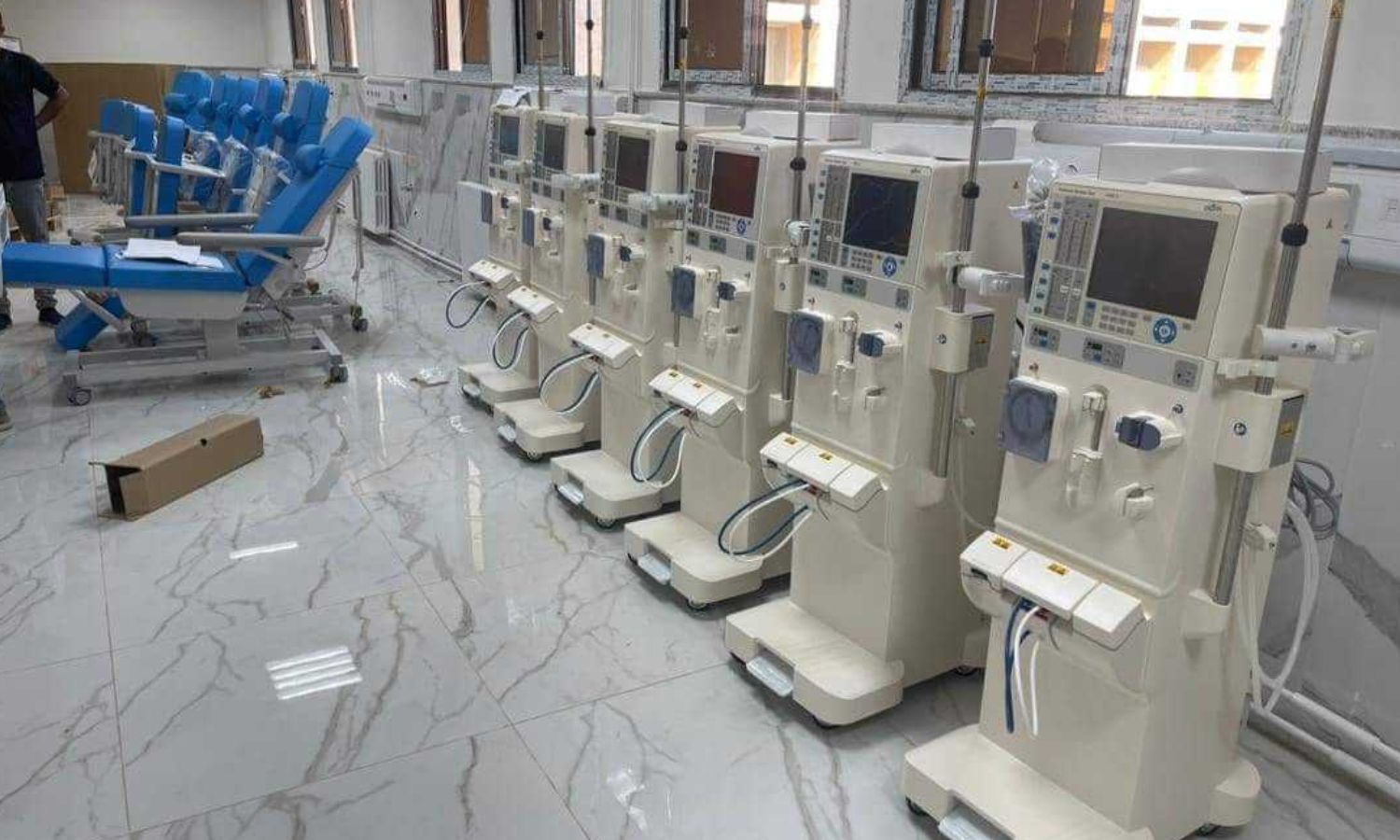



Al-Hasakah – Majd al-Salem
Kidney dialysis patients in the city of Qamishli face many challenges in obtaining the necessary treatment amid difficult health conditions and deteriorating economic conditions suffered by the residents of al-Hasakah governorate in northeastern Syria.
Most dialysis patients in Qamishli depend entirely on periodic dialysis sessions to maintain their lives.
These patients suffer from a severe shortage of medicines and treatment supplies, as basic medicines for dialysis sometimes become unavailable, and if they are available, their high prices put them beyond the reach of many patients.
Twice a week, Muhaimid, 66, who declined to mention his full name for personal reasons, is forced to go to the dialysis center in the Alaya district in Qamishli, run by the Autonomous Administration of North and East Syria (AANES) as he suffered from kidney failure about a year and a half ago, turning his life into “an unbearable hell,” as he described it to Enab Baladi.
The US dollar is trading at 13,850 SYP according to the S-P Today website, which covers the trading rate of the Syrian pound to the dollar.
Muhaimid, who is from the Jazaa area south of Qamishli, said that he travels a distance of about 100 kilometers to reach the nearest dialysis center.
“In the beginning, things were good in terms of the available services, tools, and materials. We did not have to buy anything except to pay the road fare, and month after month, things began to get worse,” said Muhaimid, adding that materials and tools became missing in the center, which greatly increased the patients’ suffering.
The sixty-something-year-old man cannot go to the center and receive treatment for about four continuous hours alone, as it is “very tiring” and consumes his “physical and psychological energy,” so every time one of his children accompanies him to buy most of the tools and medications needed for dialysis sessions at his own expense, in light of the deterioration of living conditions and the continuous rise in the prices of medicines and medical supplies.
For every dialysis session (twice a week), Muhaimid needs medicines and equipment that he pays for from his own pocket, such as Heparin medication for 100,000 pounds, tubes or hoses for 50,000 pounds, a “filter” for 100,000 pounds, and tongs for 30,000 pounds, in addition to a number of “serums” at a cost of about 60,000 pounds.
Each session costs the patient about 300,000 pounds, which can be increased depending on the price of the dollar because materials and medicines are often purchased from private centers, according to Muhaimid, stressing that all kidney failure patients in the dialysis center, which contains six machines, face the same suffering, and some of them may need three weekly dialysis sessions.
In turn, the AANES Health Authority announced tenders to provide dialysis materials for “filters,” arterial and intravenous tubes, and AV fistula only, without securing them in the centers at the time of the publication of this report.
Enab Baladi contacted the media office of the AANES’ Health Authority in Qamishli regarding patients’ complaints related to purchasing medicines at their personal expense.
The office denied what was mentioned by the patients whom Enab Baladi met, pointing out that the center receives patients and provides many services to citizens and that medicines are available and provided to everyone so that there is no need to buy medicines from other places.
“The pressure on the center is great, and the patient needs to register an appointment, which is a mechanism followed in all health centers in the world,” the Health Authority responded.
“A journey of torment and bitterness,” a phrase repeated more than once by the 55-year-old Ismail al-Khalif as he described to Enab Baladi his suffering in visiting dialysis centers in Qamishli and al-Hasakah “in search of the best treatment facility,” as the path is exhausting and expensive.
It is rare for al-Khalif to find all the medicines and tools he needs for the session for free, and most of the time, he buys the equipment at his own expense, “even bandages, alcohol, and medical tape,” adding that there is a large number of patients waiting for their turn for hours to get an empty bed and device, and this alone is very exhausting and frustrating.”
Al-Hasakah governorate includes four dialysis centers, namely the Lou’loua Center and Al-Qamishli Hospital (in regime-controlled areas), and the Alaya and al-Malikiyah Centers (Run by the AANES).
All the centers are similar, albeit to varying degrees, in the lack of medicines and tools, expensive medical supplies, and sometimes, it is not possible to perform a 100% free dialysis session.
According to a report by local Al-Khabar TV, only two out of nine dialysis machines in the Qamishli National Hospital are working.
Dr. Omar al-Akoub, director of the Qamishli National Hospital, said that the hospital is unable to repair the faults of the equipment that requires special technicians from Damascus who cannot come to the region “due to the security conditions.”
Al-Akoub added, “The department conducts approximately 1,000 dialysis sessions per month for 126 patients, who visit the department periodically, including a number of people from Deir Ezzor and Raqqa governorates, which has put great pressure on the department originally allocated to the Qamishli region.”
The official Syrian News Agency (SANA) quoted al-Akoub as saying that the Qamishli Hospital received at the end of last September a set of medical devices and supplies for the artificial kidney department, in cooperation with the World Health Organization (WHO), including six dialysis machines.
if you think the article contain wrong information or you have additional details Send Correction